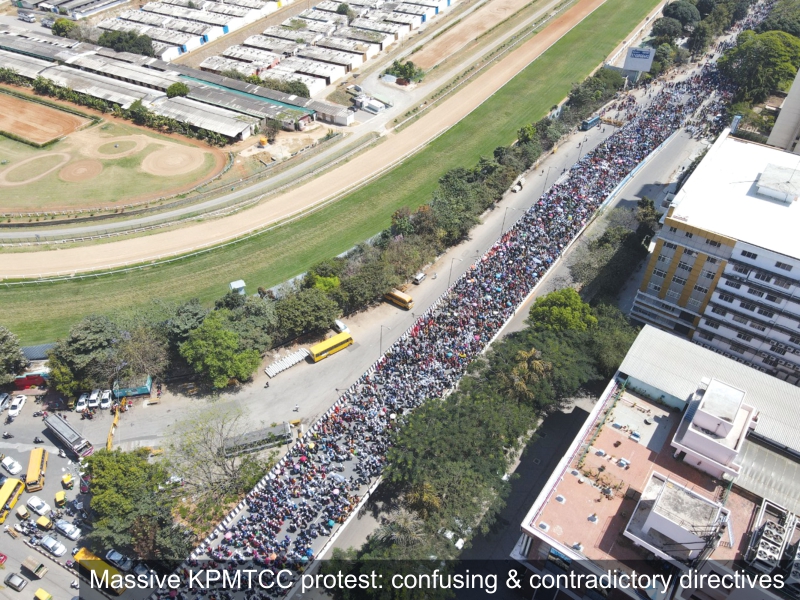
Bandana Brahmin (Bengaluru)
An early year notification to all private schools in Karnataka to collect only 70 percent of tuition fees for the current extended academic year ending May 31, provoked an unprecedented protest shutdown of over 100 private unaided schools statewide on February 23. On the same day, a protest rally led by a newly-formed Karnataka Private Schools Managements, Teaching and Non-Teaching Staff Coordination Committee (KPMTCC) attracted an estimated 50,000 teachers and employees in downtown Bengaluru causing massive traffic jams and snarls.
With schools shuttered in Karnataka for close to a year to check the spread of the novel Coronavirus, even though most private school managements quickly and commendably switched to new digital technologies empowered online classes to continue their students’ education, the state’s BJP government has been issuing several fee reduction circulars on grounds that schools have not been providing co-curricular and sports education. Moreover, government ministers and spokespersons have encouraged parents to default and/or defer fees payment while simultaneously directing schools to provide online learning and pay teachers and staff salaries.
With the dismally low fees collection depleting their cash flows, private school managements have been compelled to slash teachers’ salaries and in some cases their service. The spate of confusing and contradictory directives of the state government on school fees have hit affordable budget private schools (BPS) that constitute 90 percent of the private schools in the state, especially hard.
The contention of private school managements, which are quite clearly backing the teachers and staff agitation, is that they have invested heavily in digital infrastructure and training teachers to conduct online classes while continuing to incur campus, buses and maintenance staff and overheads expenses. Therefore, a January 29 government directive to the state’s private schools to forego 30 percent of the tuition fees and waive all other fees for the academic year 2020-21, is unreasonable and violative of their fundamental right to pursue the vocation of education provision as held by the Supreme Court in the landmark T.M.A. Pai Foundation Case (2002).
Private school managements make no secret that they are backing the KPMTCC agitation. “Most private schools have been compelled to reduce or delay teachers’ salaries because our cash flows have been completely disrupted following confusing government directives not to collect fees even if we are conducting online classes and paying teachers and staff salaries. And now the notification to collect 70 percent of tuition fees – and no other fee – has made it impossible for a large number of private schools to pay full teachers’ salaries. I’m not surprised that teachers are protesting unwarranted government interference with private schools,” says Mansoor Ali Khan, general secretary of the Management of Independent CBSE Schools Association of Karnataka.
On the other hand, parents with children in private schools maintain that their managements tend to be unmindful and unsympathetic to the reality that a large number of them have suffered salary cuts and loss of income during the lockdown of all industry and business for almost six months because of the Covid-19 pandemic. “The government has directed schools to collect only 70 percent of the tuition fees and no other fees, but several CBSE and ICSE schools have refused to comply with this directive. As of now, we intend to pay the fees as per the government order but if it is revoked, we will protest,” warns Mohamed Shakeel, president, Voice of Parents Karnataka Association.
“India’s middle class has been thoroughly spoilt by unwarranted, non-merit subsidies. In the school fees control issue, middle class parents who insist on sending their children to private schools, have been continuously demanding subsidisation by private school promoters. And ignorant politicians are supporting parents’ breach of contracts they sign when they send their children to private schools. In law, the demands of parents for the reduction or waiver of contracted fees and the government’s notification reducing private school fees are both unmaintainable,” says a senior counsel of the Karnataka high court, speaking on condition of anonymity.
In this connection, it’s worth noting that on February 8, the Supreme Court struck down a fees reduction order of the Rajasthan high court. Likewise, following the filing of writ petitions by the Associated Managements of Primary and Secondary Schools in Karnataka (KAMS) and the Karnataka State Minorities Educational Institutions Federation challenging the Karnataka state government’s 30 percent tuition fees reduction order to private schools, on February 24, the Karnataka high court ordered the state government to file its reply within ten days.